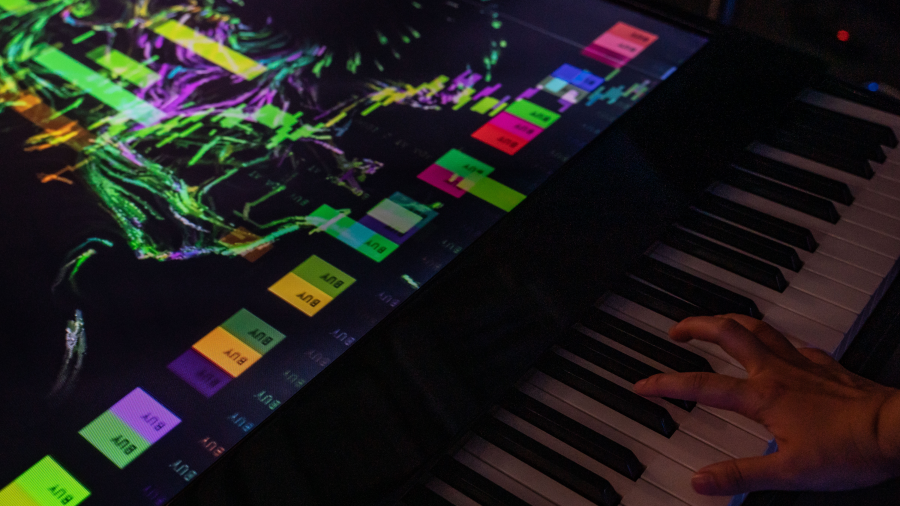How does copyright law affect the sale and distribution of NFTs?

Nonfungible tokens, or NFTs, are basically digital certificates of ownership, a virtual claim that an image or gif or even a song belongs to you. And while some artists are happy to jump into this new space, others have been surprised — or furious — to find that strangers beat them to owning and selling NFTs of their work.
Just last week, several musical artists publicly complained after the website HitPiece temporarily listed NFTs for their songs or albums without the artists’ permission.
But does selling someone else’s art as an NFT break the law? Aram Sinnreich is a professor and chair of the communication studies division at American University. He said this gets into a gray area, at least when it comes to existing copyright law. The following is an edited transcript of our conversation.

Aram Sinnreich: One of the things that [copyright law] does really well is it prevents people from being able to do certain things with a creative work unless they have permission from the person who created it. And those things include copying it or distributing it or displaying it in public or adapting it into a new artwork. An NFT isn’t really any of those things. An NFT is more like a URL. It’s just a code that points at an artwork. There’s nothing illegal about pointing at something. And so there’s not really a copyright element that comes into play because the original artwork is not being adapted or distributed or copied in any meaningful way.
Kimberly Adams: So we’ve read about songs being sold as NFT, but it’s not exactly the songs, right?
Sinnreich: Yeah, that’s correct. I think most of the people buying NFTs have no idea what it is that they’re actually buying. There was a craze for buying the rights to name stars a few years ago, right?
Adams: I remember.
Sinnreich: And you didn’t actually get to own the star, let alone travel to the star. All you got was your name written down in a ledger somewhere that said that you are the owner of said star, right? An NFT is exactly the same. It’s just a ledger somewhere that says you are associated with a given file. But somebody else can write their own ledger totally separately and attach someone else’s name to that star.
Adams: This is where the whole, are NFTs scams to begin with? comes in, because what is the value of this pointer?
Sinnreich: Right. Well, this is a great example of what’s known as a speculative bubble. The vast majority of money that people are spending on NFTs aren’t spent because they’re in love with the underlying artwork. The only reason people are spending money on this stuff is because they’re reasonably assured that before the bubble bursts, they’ll be able to sell it for more than they spent on it.
Adams: How different is assigning value to NFTs to assigning value to any other kind of artwork?
Sinnreich: Artworks have basically been assigned value based on their scarcity and their perceived market value, rather than the actual value that they have in people’s lives, right? I could have a poster of the “Mona Lisa,” and it’s worth $10, but the actual “Mona Lisa” is worth orders of magnitude more than that. So this kind of sense that artworks are based on scarcity and based on perceived value long predates NFTs. What’s different about NFTs is that they’re not just being applied to unique artworks like the “Mona Lisa,” they’re also being applied to things that are mass-produced and infinitely mass-producible, like MP3s or digital video files or JPEGs. And those kinds of files have very limited market value unless they’re artificially created as scarce artifacts. And NFTs exist for one purpose only, which is to impose artificial scarcity on something that’s infinitely reproducible with a click of a button.
Adams: How does what we’re seeing with NFTs now and artists feeling like their music is being stolen or used without their permission, compared to what we saw with music piracy in the early 2000s on platforms like Napster or LimeWire?
Sinnreich: From a technological and economic standpoint, it’s a totally different situation than Napster. But one thing that unites them is that in both cases, the kind of perceived sense of value and the perceived sense of harm differs from the legal and technological realities. So if I were to make an artwork and somebody else created an NFT out of it, I would feel a kind of personal harm because there’s an underlying kind of moral sense of my relationship to the artwork that has no bearing on what the actual law says. And in this case, there is no law. We don’t know what the laws of NFTs are because Congress hasn’t written any and no courts have really had to judge it yet. So this is a completely open space, where the people investing in these products have no idea how legally enforceable their claims will be regardless of what their kind of emotional investment in the relationships to the works are.
Related links: More insight from Kimberly Adams
There may not be much legal precedent on NFTs now, but that could change soon. Last week, Nike sued an online reseller over that company’s sale of NFTs of Nike shoe images. That same story also mentioned that last month, luxury goods designer Hermes sued an artist for an NFT featuring the company’s famous Birkin bags.
And for more on that HitPiece scandal and the aftermath, Vice has been covering that story.
Bloomberg Law also took a look at just how copyright law may or may not apply to NFTs. The author makes the argument that it may come down to whether the courts decide if NFTs fall under the legal concept of “first sale doctrine.”
There is so much money at stake in this fight too. According to The Guardian, the market for NFTs grew to an estimated $22 billion last year.
The future of this podcast starts with you.
Every day, the “Marketplace Tech” team demystifies the digital economy with stories that explore more than just Big Tech. We’re committed to covering topics that matter to you and the world around us, diving deep into how technology intersects with climate change, inequity, and disinformation.
As part of a nonprofit newsroom, we’re counting on listeners like you to keep this public service paywall-free and available to all.
Support “Marketplace Tech” in any amount today and become a partner in our mission.


















